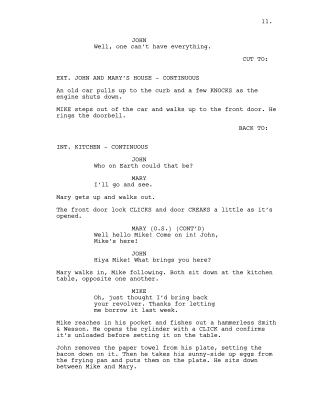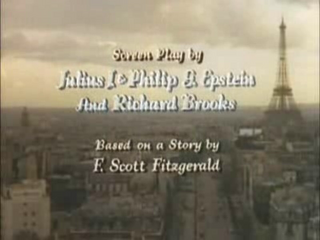
A screenplay writer is a writer who practices the craft of screenwriting, writing screenplays on which mass media, such as films, television programs, and video games, are based.

The Academy Award for Best Adapted Screenplay is the Academy Award for the best screenplay adapted from previously established material. The most frequently adapted media are novels, but other adapted narrative formats include stage plays, musicals, short stories, TV series, and even other films and film characters. All sequels are also considered adaptations by this standard.
A teleplay is a screenplay or script used in the production of a scripted television program or series. In general usage, the term is most commonly seen in reference to a standalone production, such as a television film, a television play, or an episode of an anthology series. In internal industry usage, however, all television scripts are teleplays, although a "teleplay by" credit may be classified into a "written by" credit depending on the circumstances of its creation.
A film producer is a person who oversees film production. Either employed by a production company or working independently, producers plan and coordinate various aspects of film production, such as selecting the script, coordinating writing, directing, editing, and arranging financing.
A showrunner is an established writer and the top-level executive producer of a television series production, who outranks other creative personnel, including episode directors, in contrast to feature films, in which the director has creative control over the production, and the executive producer's role is limited to investing.

Joseph Leo Mankiewicz was an American film director, screenwriter, and producer. Mankiewicz had a long Hollywood career, and won both the Academy Award for Best Director and the Academy Award for Best Adapted Screenplay in consecutive years for A Letter to Three Wives (1949) and All About Eve (1950), the latter of which was nominated for 14 Academy Awards and won six.

Herman Jacob Mankiewicz was an American screenwriter who, with Orson Welles, wrote the screenplay for Citizen Kane (1941). Both Mankiewicz and Welles would go on to receive the Academy Award for Best Original Screenplay for the film. He was previously a Berlin correspondent for Women’s Wear Daily, assistant theater editor at The New York Times, and the first regular drama critic at The New Yorker. Alexander Woollcott said that Mankiewicz was the "funniest man in New York".
A television producer is a person who oversees one or more aspects of video production on a television program. Some producers take more of an executive role, in that they conceive new programs and pitch them to the television networks, but upon acceptance they focus on business matters, such as budgets and contracts. Other producers are more involved with the day-to-day workings, participating in activities such as screenwriting, set design, casting, and directing.

The Writers Guild of America (WGA) credit system for motion pictures and television programs covers all works under the jurisdiction of the Writers Guild of America, East (WGAE) and the Writers Guild of America, West (WGAW). The WGA, originally the Screen Writers Guild, has since 1941 been the final arbiter of who receives credit for writing a theatrical, television or new media motion picture written under its jurisdiction.

Hart to Hart is an American mystery television series that premiered on August 25, 1979, on ABC. The show stars Robert Wagner and Stefanie Powers as Jonathan and Jennifer Hart, respectively, a wealthy couple who lead a glamorous jetset lifestyle and regularly find themselves working as unpaid detectives in order to solve crimes in which they become embroiled. The series was created by novelist and television writer Sidney Sheldon. The series ended after five seasons on May 22, 1984, but was followed by eight made-for-television movies, from 1993 to 1996.
A script doctor is a writer or playwright hired by a film, television, or theatre production company to rewrite an existing script or improve specific aspects of it, including structure, characterization, dialogue, pacing, themes, and other elements.

Jeffrey Michael Lieber is an American screenwriter for both television and film. He is credited as a co-creator of the television series Lost. In addition to writing for television and film, Lieber also blogs at the website dailykos. His blog posts, which appear as "diaries" rather than front-page posts, typically have a satirical take on the news.

Thomas Frank Mankiewicz was an American screenwriter, director, and producer of motion pictures and television whose credits included James Bond films and his contributions to Superman: The Movie (1978) and the television series Hart to Hart. He was the son of Joseph Mankiewicz and nephew of Herman Mankiewicz.
Ted Tally is an American playwright and screenwriter. He adapted the Thomas Harris novel The Silence of the Lambs into the film of the same name, for which he received the Academy Award for Best Adapted Screenplay, the Writers Guild of America Award, the Chicago Film Critics Award, and the Edgar Award from the Mystery Writers of America.

David A. Goodman is an American writer, producer, and president of the Writers Guild of America West. He has been a writer for several television series, such as The Golden Girls, his first job; Futurama, where he was also a co-executive producer and wrote the notable Star Trek parody episode "Where No Fan Has Gone Before"; and Star Trek: Enterprise. Goodman produced Stewie Griffin: The Untold Story, and is the writer of Fred: The Movie, a 2010 film based on the Fred Figglehorn YouTube series, as well as the sequel, Fred 2: Night of the Living Fred. In 2022 he wrote the critically-acclaimed film Honor Society for Paramount+.
Lynn Marie Latham is an American television writer, producer, and showrunner. Her initial foray into writing for television was as a story editor for the series Berrenger's in 1985. That same year, Latham became a writer for the nighttime serial Knots Landing.

Lawrence "Larry" Kaplow is an American television writer and producer most notable for his work on the FOX series House. He won the 2005 Writers Guild of America Award for "Outstanding Television Script, Episodic Drama" for the House episode "Autopsy".
Bernard Lechowick is an American television writer and producer. He grew up in Mentor, Ohio and is a father of two sons, Richard Latham Lechowick and Vincent Latham Lechowick. Lechowick graduated from the University of Notre Dame. For his graduate studies, he chose University of Texas at Austin to complete a master's degree in Radio, Television and Film, and it is there that he met his wife, Lynn Marie Latham.

"Raising Kane" is a 1971 book-length essay by American film critic Pauline Kael, in which she revived controversy over the authorship of the screenplay for the 1941 film Citizen Kane. Kael celebrated screenwriter Herman J. Mankiewicz, first-credited co-author of the screenplay, and questioned the contributions of Orson Welles, who co-wrote, produced and directed the film, and performed the lead role. The 50,000-word essay was written for The Citizen Kane Book (1971), as an extended introduction to the shooting script by Mankiewicz and Welles. It first appeared in February 1971 in two consecutive issues of The New Yorker magazine. In the ensuing controversy, Welles was defended by colleagues, critics, biographers and scholars, but his reputation was damaged by its charges. The essay and Kael's assertions were later questioned after Welles's contributions to the screenplay were documented.

The authorship of the screenplay for Citizen Kane, the 1941 American motion picture that marked the feature film debut of Orson Welles, has been one of the film's long-standing controversies. With a story spanning 60 years, the quasi-biographical film examines the life and legacy of Charles Foster Kane, played by Welles, a fictional character based in part upon the American newspaper magnate William Randolph Hearst and Chicago tycoons Samuel Insull and Harold McCormick. A rich incorporation of the experiences and knowledge of its authors, the film earned an Academy Award for Best Original Screenplay for Herman J. Mankiewicz and Welles.











